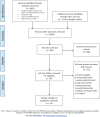The Effects of Diet on the Proportion of Intramuscular Fat in Human Muscle: A Systematic Review and Meta-analysis
- PMID: 29516003
- PMCID: PMC5826234
- DOI: 10.3389/fnut.2018.00007
The Effects of Diet on the Proportion of Intramuscular Fat in Human Muscle: A Systematic Review and Meta-analysis
Abstract
Background: There is an increasing trend in the consumption of poor-quality diets worldwide, contributing to the increase of non-communicable diseases. Diet directly influences physiological composition and subsequently physical health. Studies have shown that dietary macronutrient and energy content can influence the proportion of intramuscular fat (IMF), which mediates various metabolic and endocrine dysfunction. The purpose of this systematic review was to identify evidence in the literature assessing the association between different dietary interventions on the proportion of IMF in humans.
Methods: Three medical databases were investigated (Medline, EMBASE, and Cochrane) to identify studies assessing changes in IMF after dietary interventions. The primary outcome measure was the change in IMF proportions after a dietary intervention. The effects of high-fat, high-carbohydrate, low-calorie, and starvation diets were assessed qualitatively. A meta-analysis assessing the effect of high-fat diets was conducted. Follow-up sensitivity and subgroup analyses were also conducted.
Results: One thousand eight hundred and sixty-six articles were identified for review. Of these articles, 13 were eligible for inclusion after a full screening. High-fat diets increased IMF proportions, standardized mean difference = 1.24 (95% confidence interval, 0.43-2.05) and a significant overall effect size (P = 0.003). Diets with an increased proportion of carbohydrates decreased IMF proportions; however, increasing caloric intake with carbohydrates increased IMF. Starvation diets increased IMF stores, and hypocaloric diets did not result in any IMF proportion changes.
Conclusion: This systematic review suggests that high-fat diets and diets with caloric intake increased above the amount required to maintain BMI with carbohydrates, and short-term starvation diets are associated with increases in IMF content. Further studies are needed to assess the effects of macronutrient combinations on IMF and the influence of diet-induced IMF alterations on health outcomes. In addition, IMF poses a possibly effective clinical marker of health.
Keywords: diet; energy; high-fat diets; intramuscular fat; review.
Figures
References
-
- Lim SS, Vos T, Flaxman AD, Danaei G, Shibuya K, Adair-Rohani H, et al. A comparative risk assessment of burden of disease and injury attributable to 67 risk factors and risk factor clusters in 21 regions, 1990–2010: a systematic analysis for the global burden of disease study 2010. Lancet (2012) 380(9859):2224–60.10.1016/S0140-6736(12)61766-8 - DOI - PMC - PubMed
Publication types
LinkOut - more resources
Full Text Sources
Other Literature Sources



